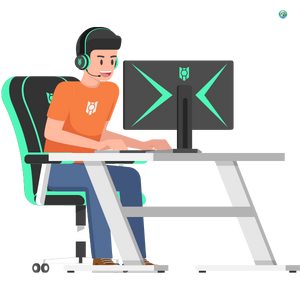
Dr Sathiya Ganesan’s
Unplug. Restart. Reconnect — Helping Children Break Free From Gaming and Rebuild Real-Life Balance
Empowering Young Minds to Regain Balance, Focus, and Real-World Joy
Video games can be fun, social, and even skill-building, but when gaming begins to consume a child’s thoughts, emotions, and time, it may signal something more serious.
Gaming, also known as Internet Gaming Disorder, is a growing concern in today’s digital world. It affects emotional regulation, sleep, academics, and real-life relationships.
Dr. Sathiya Ganesan, Consultant in Child & Adolescent Psychiatry, offers specialized, compassionate care to help children and families manage excessive gaming and build a healthier, more fulfilling lifestyle.
Understanding Gaming Disorder
When Play Turns Into a Pattern That’s Hard to Break

Gaming disorder goes beyond high screen time. It involves:
- Preoccupation with games
- Cravings and withdrawal symptoms when not playing
- Loss of interest in real-life activities
- Escalating time spent gaming despite consequences
- Use of games to escape stress, anxiety, or loneliness
This behavioural disorder activates the brain’s reward circuits, leading to compulsions that mimic substance disorder.
Signs of Gaming Disorder in Children
- Irritability, restlessness, or aggression when asked to stop playing
- Sneaking game time or lying about usage
- Falling grades or skipped assignments
- Sleep problems due to late-night gaming
- Neglect of hygiene, meals, or social interaction
- Preference for virtual interaction over real-life play
- Emotional dependence on gaming for happiness
When a child prioritises gaming over school, sleep, or relationships, professional intervention may be needed.
Holistic, In-Depth Evaluation
Dr. Ganesan begins with a detailed assessment to understand:
- Gaming patterns, frequency, and triggers
- Emotional and mental health background
- Co-occurring concerns (ADHD, anxiety, depression, autism)
- Academic and behavioral impact
- Family dynamics and screen-time routines
This forms the basis for a personalized treatment plan focused on recovery and balance.
Compassionate Communication and Insight Building
Children addicted to games often feel misunderstood or ashamed. Dr. Ganesan offers:
- A non-judgmental space to discuss gaming habits
- Awareness-building around triggers and emotional needs
- Education on how gaming affects the brain and mood
- Emotional validation to foster trust and engagement
Healing begins with empathy, not enforcement.
Expert Psychotherapeutic Interventions
Therapeutic care includes:
- Cognitive Behavioral Therapy (CBT) – to manage cravings and restructure thought-behavior cycles
- Impulse control and frustration tolerance training
- Digital detox planning with gradual reduction goals
- Motivational Enhancement Therapy to boost internal drive for change
- Family therapy and screen boundary coaching
The goal is not just to stop gaming, but to replace it with emotional resilience and real-world rewards.
Judicious Use of Medications
When gaming desorder is tied to:
- ADHD or impulsivity
- Mood disorders
- Sleep disturbances
Dr. Ganesan may consider medication support. Medications are used conservatively and only with parental consent, as part of an integrated treatment plan.
Lifestyle Coaching and Recovery Planning
Children are guided to:
- Re-establish healthy sleep and eating patterns
- Discover offline hobbies and physical activities
- Build emotional coping skills without digital escape
- Engage in social interaction and confidence-building activities
- Develop structured routines with screen-free time
The path forward is not punishment — it’s rediscovery and balance.
Family Support and Home Strategies
Dr. Ganesan works closely with parents to:
- Set realistic, respectful screen-time boundaries
- Manage tech-related conflicts calmly
- Create engaging family routines and shared time
- Reinforce positive behaviors with structure and praise
- Reduce guilt and reactivity around digital parenting
When families heal together, children regain control faster and more confidently.

Why Choose Dr. Sathiya Ganesan for Gaming Disorder Recovery?
With deep expertise in child psychiatry, technology overuse, and behavioral science, Dr. Sathiya Ganesan provides:
- Judgment-free, developmentally appropriate care.
- Personalized therapy tailored to emotional and digital needs
- Whole-family support for long-term success
- A recovery model focused on freedom, not fear
From Gaming Disorder to Real-Life Connection
If your child is struggling with excessive gaming or emotional dependence on screens, don’t wait.
Contact Dr. Sathiya Ganesan today to begin a compassionate, effective path toward emotional freedom and digital balance.
Is gaming disorder a real diagnosis?
Yes. Gaming disorder is recognized by the WHO and can severely impact a child’s emotional, academic, and social life.
How much gaming is too much?
More than 2 hours/day consistently, especially when it leads to emotional distress or interference in daily life, may be problematic.
Do I need to ban games completely?
Not always. Gradual reduction, emotional support, and positive routine-building are more sustainable than strict bans.
Can gaming disorder be treated without medication?
Often yes. Therapy, coaching, and family support are the first-line treatments. Medication is used only when other disorders are involved.
What if my child becomes aggressive when stopped?
That’s common. Dr. Ganesan provides strategies to handle withdrawal behavior while promoting cooperation and calm transitions.


